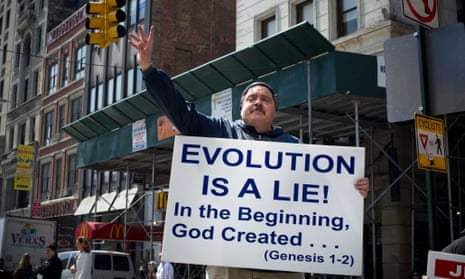A major survey of US opinions has revealed that huge numbers of people reject Darwinian evolution, consider GM foods unsafe to eat, and doubt that human activity is warming the planet.
The report by the Pew Research Center in Washington DC was conducted with the American Association for the Advancement of Science (AAAS) and sought to compare the opinions of a cross-section of the US public with those held by the AAAS’s scientific members.
Published in the journal Science, the survey found that 31% of the US public believed that humans had existed in their present form since the beginning, with a further 24% stating that humans had evolved under the guiding hand of a supreme being. In contrast, only 2% of AAAS scientists said humans had not evolved in their time on Earth.
The proportion of the public who believed evolution had happened through natural processes, as described by Charles Darwin more than 150 years ago, was only slightly greater than a third at 35%. The survey drew on phone interviews with 2,002 US adults chosen to be representative of the nation, and online questions of 3,748 US-based members of the AAAS.
The US has embraced genetically modifed crops, with 69m hectares (170.4m acres) given over to their cultivation, but the survey suggests the technology is still regarded as contentious by a significant portion of US society. A striking 57% of the public surveyed by Pew believed that GM foods were unsafe to eat. The overwhelming view of the scientists, was that the food was safe, with 88% having no concerns about eating GM.
Perhaps the most contentious issue the survey touched on was climate change, where only half of the population agreed with the Intergovernmental Panel on Climate Change view that climate change was mostly driven by human activity, such as the burning of fossil fuels. Nearly half said there was either no good evidence for global warming, or that the recent warming of the Earth was due to natural climate variability.
Scientists and the broader public disagreed most strongly about the safety of GM foods, though their views differed substantially on global warming too, with 87% of scientists believing that climate change was mostly caused by human activity.
Alan Leshner, the chief executive of the AAAS, said the survey revealed a worrying gulf between the opinions held by scientists and the general public. “There is a disconnect between the way in which the public perceives the state of science and science’s position on a variety of issues,” he said. “And that’s a cause of concern.”
Cary Funk, lead author of the report, said the number of issues that scientists and the public disagreed on, and the amount to which they disagreed, were both surprising. One of the few issues the two groups did agreed on was that the International Space Station had been a good investment for the country.
There were some other areas where scientists and the public shared concerns. Both delivered damning verdicts on US science education, the K-12 primary and secondary school system. Among the general public, 68% considered US science education average or below average, and an overwhelming proportion of scientists, 84%, agreed with them.
In some cases, a poor science education was at the heart of the differences in opinion, Leshner said. “Sometimes it’s simply a lack of understanding, sometimes it’s an economic or a politicial issue, and sometimes it’s a conflict between, say, core religious belief, or core values, and what science is showing,” he said. “In all of these cases, science is being trumped by these other factors and scientists need to do something to turn that around.”
“It’s not about whether the public is dumb or not. It’s partly a function of the American educational system that does a terrible job ... at educating young people in science, math and technology,” he added.
Perhaps reflecting a common scepticism over climate change, the survey found greater support among the public for fracking and offshore drilling than among the scientists. Enthusiasm for building more nuclear power plants was far higher among the scientists than the public, with 65% versus 45% in favour.
In an accompanying editorial, Leshner issued a call to arms, urging scientists to strike up “respectful dialogues” with groups in community clubs, science museums and religious institutions. “The opinion gap must not be allowed to swell into an unbridgeable chasm,” he warned.
“We need to have what scence is showing be represented accurately and for people to at least have that in their toolbox when they make their own decisions,” Leshner said. “It works against the benefit of humankind for people to have distorted views of what the actual facts are.”

Comments (…)
Sign in or create your Guardian account to join the discussion